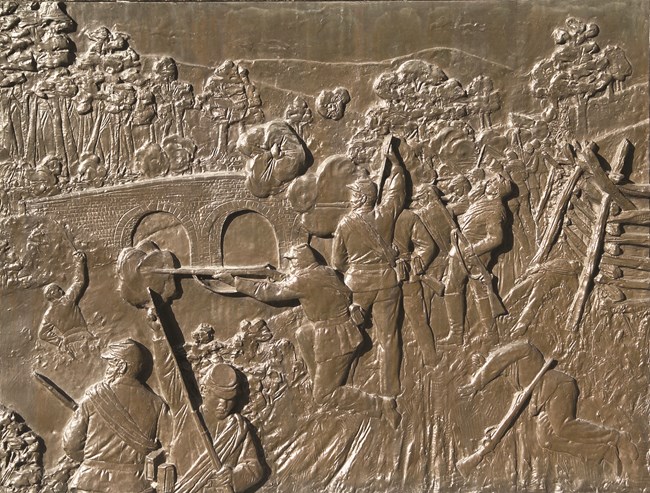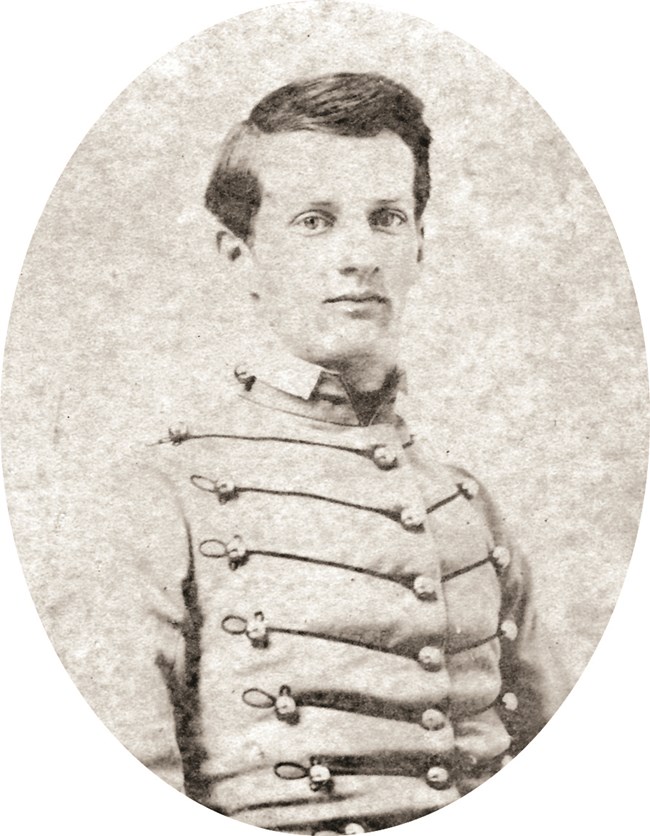“All the rebel batteries were now roaring. The air rang with whistling balls, and the ground quaked with the hard breath of artillery. The 11th Connecticut descended to storm Antietam Bridge. The rebel guns were pouring in a destructive fire of grape and canister, while continuous volleys from an unseen enemy in the wood were also showered upon them. Down the road leaped the Eleventh into this ‘valley of death’.” History of Connecticut during the War
Stop 3 - The 11th Connecticut MonumentThis monument to the 11th Connecticut Volunteer Infantry was dedicated on October 8, 1894. The veterans of a difficult and costly charge at Antietam returned thirty-two years later to memorialize their fallen comrades. Colonel Henry Walter Kingsbury and the men of the 11th Connecticut led the first attack on the bridge at 10:00 a.m. They advanced across the spur of this hill—the left of the line at the creek and the right on the level ground at the base of the hill. Capt. J.D. Griswold splashed into the Antietam and tried to lead his company across when he was shot down. Lt. Col. Griffen Stedman of the regiment remembered that Capt. Griswold “was the first to cross the stream and the first to fall. No tribute that I could pay is sufficient for the brave soul of Capt. Griswold. He died as he lived – pure, patriotic and brave.”Kingsbury, Confederate General David R. Jones’s brother-in-law, urged his men on. He too was shot down by what Pvt. Tillinghast of Company D described as “the hottest fire we ever received.” The Confederates were “so completely concealed that they could scarcely be distinguished through the leaves from the dark background and objects around, except by the smoke of their discharged guns.” Fighting desperately, the 11th Connecticut made a gallant effort, but after losing a third of their men, including their commander, they fell back. General George Crook’s Brigade, that was supposed to have attacked with the 11th, ended up 300 yards upstream. The first attempt to capture the bridge had failed. 
A Divided Nation - A Divided FamilyHenry Kingsbury was the son of a soldier. His father Julius, a retired Army Major, died in 1856, the same year that Henry entered West Point. Appointed as guardians for cadet Kingsbury were Ambrose Burnside and Simon Bolivar Buckner. Simon Buckner had married Henry’s sister, and he later became a Lieutenant General in the Confederate Army.After graduating fourth in his class in 1861, Henry married Eva Taylor. Eva’s sister Rebecca also married a West Point Graduate – David R. Jones. Henry Kingsbury now had two brothers-in-law that left the U.S. Army and offered their services to the Confederacy—Buckner and D. R. Jones. Jones was at the siege of Fort Sumter, fought with the Army of Northern Virginia, rose to the rank of Major General, and commanded the soldiers who on September 17 mortally wounded his brother-in-law. Four months after Antietam, David Jones died of a heart attack at the age of 37. Sisters Eva and Rebecca were now both widows. Henry Kingsbury was described by his men as a “brilliant, honorable and brave soldier...” who was “like a father to the enlisted men of his regiment.” “He was strict while on duty, but always courteous and gentlemanly.” Henry was taken to the nearby Rohrbach farm house where he was visited by Ambrose Burnside. Lt Col Griffen Stedman of the 11th Connecticut was at his side the next day and described Kingsbury’s last moments: “...the Colonel opened his eyes, had given me the sweetest, most brilliant smile, and then closed them forever.” Kingsbury never met his son Henry Walter Kingsbury Jr., who was born in December, 1862. Eyewitness“Col. Kingsbury ...brought up the left wing where he was exposed to the most intense fire...he was soon severely wounded in the heel; although much crippled he continued urging on the men, but in a few moments was again struck in the leg. Unable longer to stand he was borne from the field but in the passage was struck buy a third ball in the shoulder, by a fourth in the abdomen. At the hospital he suffered great pain during the dressing of his wounds and survived but twenty-four hours." Lt Col Griffen Stedman, 11th CT Infantry |
Last updated: February 27, 2021
